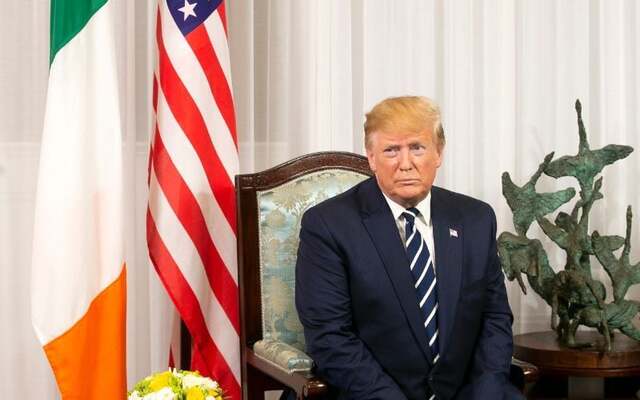If ever a post on Twitter/X should strike fear into the very heart of Ireland, it is this one.
Written by Howard Lutnick, US President-elect Donald Trump’s pick for commerce secretary in the next administration, it delivers what amounts to a chilling warning.
He writes: “It’s nonsense that Ireland of all places runs a trade surplus at our expense. We don’t make anything here anymore – even great American cars are made in Mexico.
“When we end this nonsense, America will be a truly great country again. You’ll be shocked!”
It’s nonsense that Ireland of all places runs a trade surplus at our expense. We don’t make anything here anymore—even great American cars are made in Mexico. When we end this nonsense, America will be a truly great country again. You’ll be shocked!
— Howard Lutnick (@howardlutnick) October 16, 2024
The sentiment is not new, and Trump himself rattled the sabres in his previous term, but there were steadier hands on the tiller around him, and common sense prevailed.
Now, though, Trump is surrounding himself with hawkish acolytes who, in his second and final term (well, until he attempts to change that rule too, because who would bet against it?) can create chaos without consequences.
It’s not just the fact that lower corporation tax rates might see the repatriation of Big Tech profits to the United States, but also the very real possibility of a trade war if the promise to introduce swingeing tariffs becomes a reality.
Never mind that Trump voters don’t seem to realise it is they who will pay these tariffs, and that there will be a commensurate rise in inflation when many of them voted because they wanted inflation reduced.
There is evidence all over the Internet of their surprise when this is explained, and the dime finally drops with them.
All they hear is that China will be punished, and Europe penalised too, which pleases them because they think Europe is all woke and communist with, you know, its longer holidays, maternity and paternity leave, and universal health care.
If this fear is registering with politicians campaigning in the general election, they have made a good show of concealing it, because the potential consequences for our economy vary from scary to terrifying.
Read more
Our reliance not only on corporation tax, but also on income tax, is massive.
The Central Bank points out that the information and communications sector, or ICT, accounts for 21.3% of corporation tax, and while it employs just 6.4% of the workforce, their relatively higher salaries accounted for 12% of all income tax revenue in 2021, a tenfold increase since 2012.
Yes, in just nine years, our dependence on the sector increased by that much, and that bears strong parallels with another sector, construction, that led to the boom and bust of the early years of this century.
Yet when politicians are asked if they worry about the fact that we seem to be placing so many eggs in one basket, they either dismiss the threat or point to the rainy day fund the Government has established, without ever noting it might indeed pay to repair a leaky pipe, but won’t be much use if we need a new boiler.
As the economist David McWilliams has written: “According to a report from Economics for Inclusive Prosperity, an estimated 40% of multinational profits are shifted to tax havens around the world each year, with the US estimated to lose about 15% of its corporate income tax revenue in the process.
“America wants this money back.”
Now, in one sense, it is hard to blame them. If the roles were reversed, we would certainly be shouting and screaming for Irish firms to pay all their tax here.
The problem is that the United States has benefited from globalisation for its own exports, and a tariff imposition that leads to a trade war will ultimately damage all sides.
Lutnick specifically mentions the manufacture of cars in Mexico. Just two weeks ago, I was in San Luis Potosí, an hour’s flight north of Mexico City, to visit a BMW plant that makes the 2 and 3 Series for the US and other markets.
This is how the world works now, with a German firm investing vast amounts of money in Mexico to avail of the USMCA, or United States-Mexico-Canada Agreement on free trade.
As it happens, though, one of its clauses specifically lays down quotas for each of the three countries when it comes to building cars, because the US sought to protect the long dwindling dominance of Detroit in the domestic market.
But what if the US demands similar concessions in any new trade relationship with Europe?
Will Kerrygold, this week named by the New York Times as the world’s ‘butteriest’ butter, be hit with tariffs? Jameson? Baileys?
Other superstar brands that place Ireland on the shelves of supermarkets from California to Connecticut?
The problem with Trump used to be his unpredictability.
Now, he is surrounding himself with isolationists who believe that the best way to make America great again is to pull up the drawbridge, to immigrants as well as exporters.
Life is about to get a lot more predictable. Ireland is a minnow on the world stage, exposed to a much greater extent than the likes of the UK or Germany to a trade shock.
We do know something about isolationism, though, from when Éamon de Valera imposed his vision of a frugal but happy people on this country and created economic and social torpor.
We had better hope the golden goose lays a few more eggs before it is ordered to fly home and we are forced to return once again to austerity.
We had better hope that US approval of the use of its weapons by Ukraine to directly attack Russia does not inflame an already tense situation, removing another spoke from the buckling wheel.
And we had better hope that our politicians start outlining plans for what would happen if both scenarios came to pass, and to offer credible explanations of what they would do in such an eventuality, instead of burying their heads in what is very quickly shifting sand.
*This article was originally published on BusinessPlus.ie.




Comments